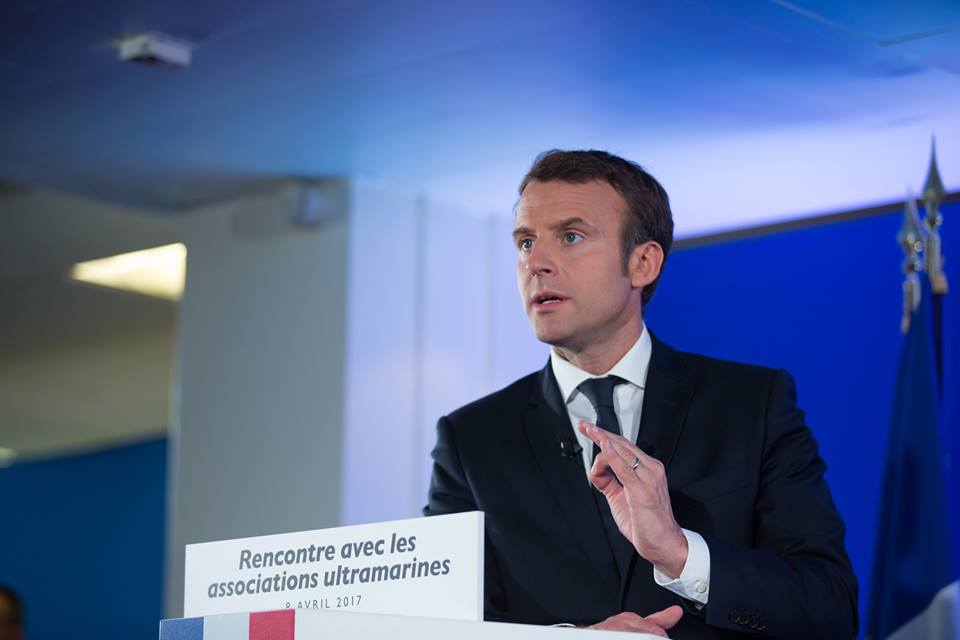
PARIS –French centrist Emmanuel Macron faces an unprecedented challenge in his quest for the French presidency: A newcomer to politics, he was virtually unknown to most of his countrymen just three years ago.
Now the tenacious 39-year-old with strong pro-business and pro-European views, and an unconventional love story, is poised to face far-right National Front leader Marine Le Pen in the May 7 presidential runoff.
A joyful crowd of some 2,000 supporters gathered at his election headquarters in Paris cheered wildly at the announcement that Macron will advance to the second round. Their enthusiasm only grew when major rivals Socialist Benoit Hamon and conservative Francois Fillon conceded defeat, then urged voters to vote for Macron in the runoff in order to defeat Le Pen.
In an American-style move unusual in French politics, Macron appeared on stage hand in hand with his wife, Brigitte, both waving at the crowd with tears in their eyes.
Brigitte Macron is 24 years his senior – the same age difference as Donald and Melania Trump– and Macron doesn’t hide that she is his closest adviser.
In his speech, Macron praised supporters for a campaign that “changed the course of our country.” Urging hope in a future with Europe instead of fear – a reference to Le Pen’s anti-European Union campaign – he declared: “The challenge is to open a new page of our political life.”
Many in the jubilant crowd waved both the French tricolour and the European Union flags, chanting, “We will win!”
Charlotte Rousselet, 31, said she used to vote for the Socialist party but believes Macron has “more modern, reformist views.”
“He represents a new way to do politics, he promotes women, youth, people for the civil society and he’s not afraid to say that he is pro-Europe”, she said.
Macron has a strong stance on economic issues, but he has also put more focus on security and the fight against terrorism in recent weeks, pledging to boost the police and military as well as the intelligence services and to put pressure on internet giants to better monitor extremism online.
To improve Europe’s security, he wants the EU to deploy some 5,000 European border guards to the external borders of the bloc’s passport-free travel zone.
A strong advocate of a free market and entrepreneurial spirit, Macron has called for France to focus on getting benefits from globalization rather than the protectionist policies advocated by both the far right and the far left.
“We need Europe, my friends, so we will rebuild it,” he told a crowd at a rally in Paris this week. “Because we will be stronger, I will rebuild a strong and balanced alliance with Germany in order to give Europe a new boost.”
Macron has also promised to shake up the political landscape by appointing a government mostly composed of new figures, some of them coming from business and civil society.
Macron has never held elected office. Socialist president Francois Hollande named him economy minister in 2014, after he worked for two years as a top adviser on economic issues at the presidential palace.
He launched his own political movement, En Marche! (In Motion!) last year to support his candidacy.
Macron and his wife have publicly described the unusual way their romance started – when he was a student at the high school where she was a teacher in the town of Amiens in northern France. A married mother of three children at the time, she was supervising the drama club. Macron, a literature lover, was a member.
Macron moved to Paris for his last year of high school. At that time, “we called each other all the time, we spent hours on the phone, hours and hours on the phone,” Brigitte Macron recalled in a televised documentary. “Little by little, he overcame all my resistances in an unbelievable way, with patience.”
She eventually moved to the French capital to join him, and divorced. They’ve been together ever since.
The couple married in 2007 and Brigitte Macron has campaigned avidly by his side.
“I don’t hide her,” Macron told BFM TV this week. “She’s here in my life, she has always been.”
Macron studied philosophy and then attended France’s elite Ecole Nationale d’Administration for graduate school.
After working as a public servant for several years, he became an investment banker at Rothschild. As economy minister, he promoted a package of economic measures – known as the Macron law– aiming at loosening some of France’s stringent labour rules in the hope of boosting job hiring. The law notably allows more stores to open on Sundays and evenings and opens up regulated sectors of the economy.
Macron was accused by many on the left of destroying workers protection. The parliamentary debate on the law drove tens of thousands of people into the streets for months of protests across France.